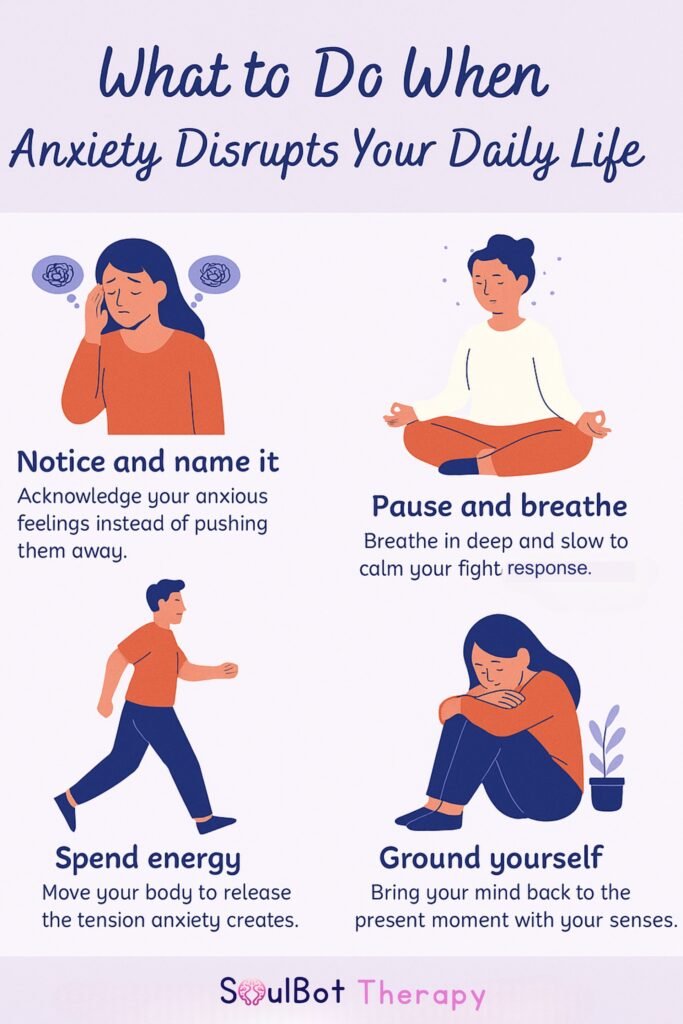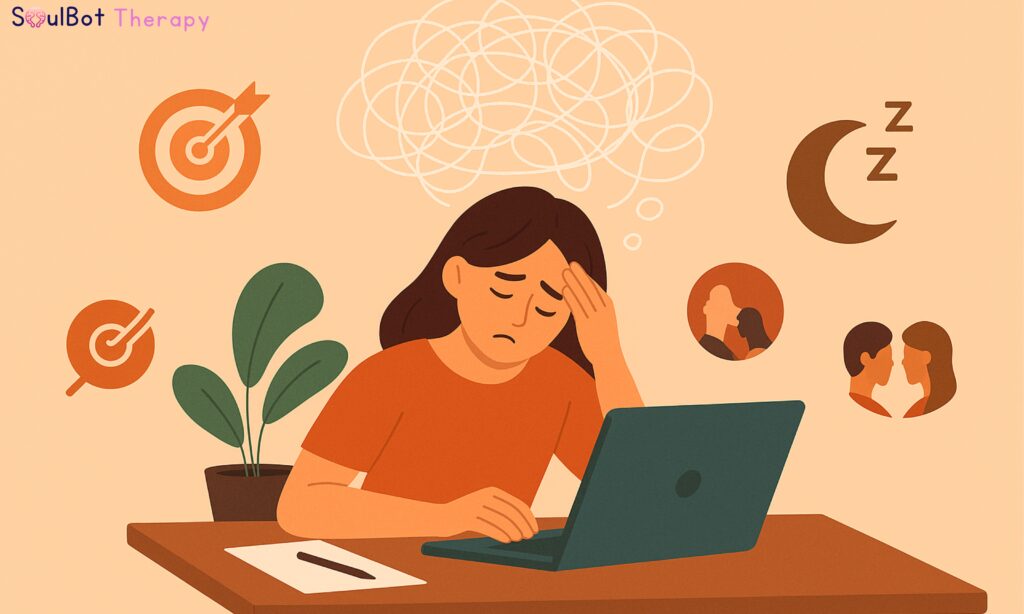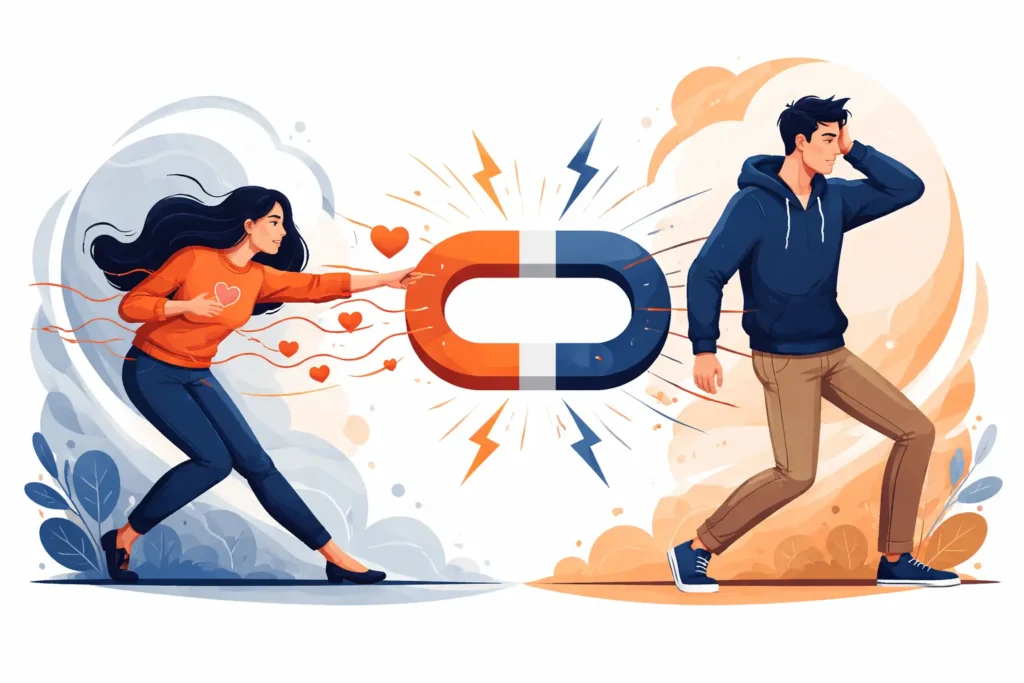Your chest tightens. You can’t breathe fully. Your brain won’t stop spinning.
You smile anyway. You nod in conversations.
But inside, it feels like you’re drowning quietly in a room full of people.
This isn’t “just stress.”
This is what anxiety feels like, and millions of people experience it every day, silently.
If you’ve ever wondered whether you’re “overreacting” or if this heaviness in your chest has a name, this blog is for you. Let’s talk about what anxiety actually feels like in the words of real people.

How & What Anxiety Feels Like?
Anxiety doesn’t look the same for everyone. But it often feels eerily similar.
Here are some of the most common emotional and physical signs:
- Your heart races for no apparent reason
- Your thoughts spiral, even when everything seems “fine.”
- You feel like something bad is going to happen, but you don’t know what
- You have trouble concentrating, sleeping, or even breathing properly
- Your stomach churns. Your muscles tense.
- You feel like you’re “too much” or “not enough” all at once
Anxiety isn’t always loud. It doesn’t always look panicked. Sometimes, it just looks like constant overthinking, with a polite smile.
Real People Describe What Anxiety Feels Like
We gathered real words (anonymized) from people living with anxiety. Here’s what they said:
- 🗣️ “It feels like my body is on high attention 24/7 — like a fire alarm that won’t turn off.”
- 🗣️ “I overthink everything. Every message I send. Every silence. I feel like I’m always one wrong word away from losing people.”
- 🗣️ “Anxiety for me is chest pain, tightness, and the constant fear that something’s going wrong — even when it’s not.”
- 🗣️ “It’s like there’s a noise in my brain I can’t shut off — thoughts looping, replaying, second-guessing everything.”
- 🗣️ “When I’m in public, I’m smiling. But inside, I’m screaming. I’m scanning for exits. I’m waiting to collapse.”
- 🗣️ “It feels like I’m carrying the weight of the world and I can’t ask anyone to help me carry it.”
Quote Block:
“Anxiety doesn’t always scream. Sometimes, it’s just a whisper that never stops.”
Is This Anxiety or Something Else?
It’s common to confuse anxiety with:
- Stress: Usually has a clear cause (e.g., deadline, test, fight) and ends when the situation passes
- Burnout: Exhaustion caused by prolonged stress, often work-related
- Health issues: Like hyperthyroidism or hormonal imbalances
But chronic anxiety sticks around even when nothing “should” be wrong.
You might feel:
- Wired but tired
- Restless but exhausted
- Numb but panicked
If your anxiety feels persistent, overwhelming, or interferes with daily life, it’s worth addressing. You’re not imagining it.
🔎 Fact Check: According to the American Psychiatric Association, anxiety disorders are the most common mental health condition in the U.S., affecting nearly 30% of adults at some point in their lives.
Emotional and Physical Symptoms of Anxiety
Here’s a full breakdown of what anxiety feels like:
🧠 Emotional Symptoms
- Constant worry or dread
- Overthinking everything
- Fear of judgment or failure
- Feeling “on edge” all day
- Feeling like something bad will happen
- Feeling stuck, frozen, or unable to act
🫀 Physical Symptoms
- Racing heart
- Tight chest or shortness of breath
- Shaky hands or legs
- Digestive issues (IBS, nausea, cramps)
- Fatigue or insomnia
- Muscle tension (particularly in the jaw, neck, and shoulders)
Why does Anxiety feel So Isolating (But Isn’t Rare)?
One of the hardest things about anxiety?
It’s invisible.
You might look “fine,” high-functioning, social, and even successful.
But inside, it feels like chaos. And because people can’t see it, they might say:
- “Just relax.”
- “You worry too much.”
- “It’s all in your head.”
But it’s not “just in your head.” It’s in your chest, your gut, your thoughts, and your nervous system.
Anxiety isn’t rare. It’s just rarely spoken about with honesty.
How to Cope When Anxiety Takes Over?
Here are 5 techniques that have helped many people ground themselves:
🌬️ 1. Box Breathing (4-4-4-4)
Breathe in for 4 → hold for 4 → exhale for 4 → hold for 4. Repeat 4x.
🧍🏽 2. 5-4-3-2-1 Grounding
List 5 things you see, 4 you feel, 3 you hear, 2 you smell, 1 you taste.
📝 3. Write the Thought Spiral Out
Externalise your anxious thoughts to make them less powerful.
🧠 4. Name What’s Happening
Say: “This is anxiety. No danger.” Naming it reduces its grip.
🤝 5. Talk to Someone Safe
Whether a therapist, friend, or support group, let someone witness you.
And if all else fails, just do the next right thing. Not everything. Just one small thing.
When to Get Help And Why You Deserve It?
Here’s the truth: You don’t have to wait until things are “bad enough.”
You can reach out:
- When it feels unmanageable
- When your thoughts won’t slow down
- When your body feels unsafe
- Or simply when you don’t want to carry this alone anymore
Anxiety is treatable. Reversible. And you deserve to feel safe in your mind.
If this blog made you feel seen, share it.
Someone you know might be carrying anxiety in silence. Let them know they’re not alone.
📩 [Share This Blog]
🧪 Or take the Anxiety Test to understand your patterns and triggers better.
Your Anxiety Is Valid, And So Are You
If you’ve made it this far, take a deep breath.
You’ve just named what so many struggle to explain.
- That’s brave.
- That’s powerful.
- That’s healing.
You’re not “too much.” Nor are you weak. You’re just someone carrying too much without support.
It’s okay to talk about it.
- 👉 Take the Love Test
- 👉 Book a Free Session if you’re ready to feel lighter for real.








